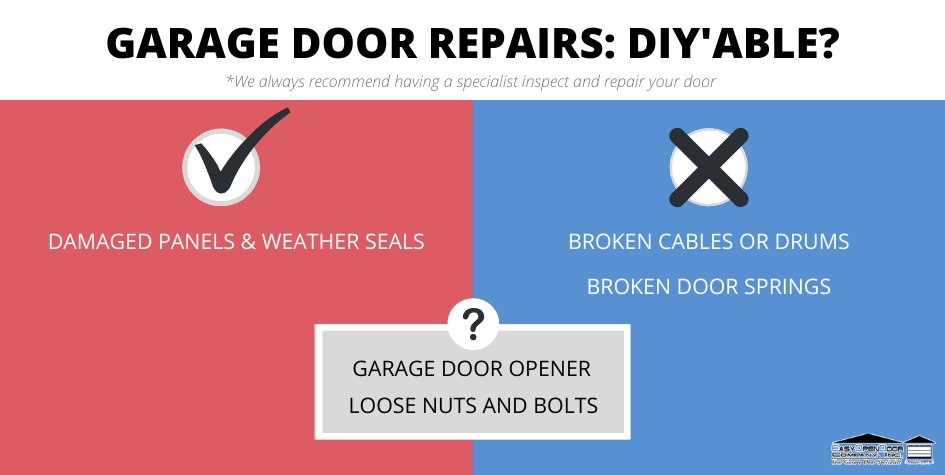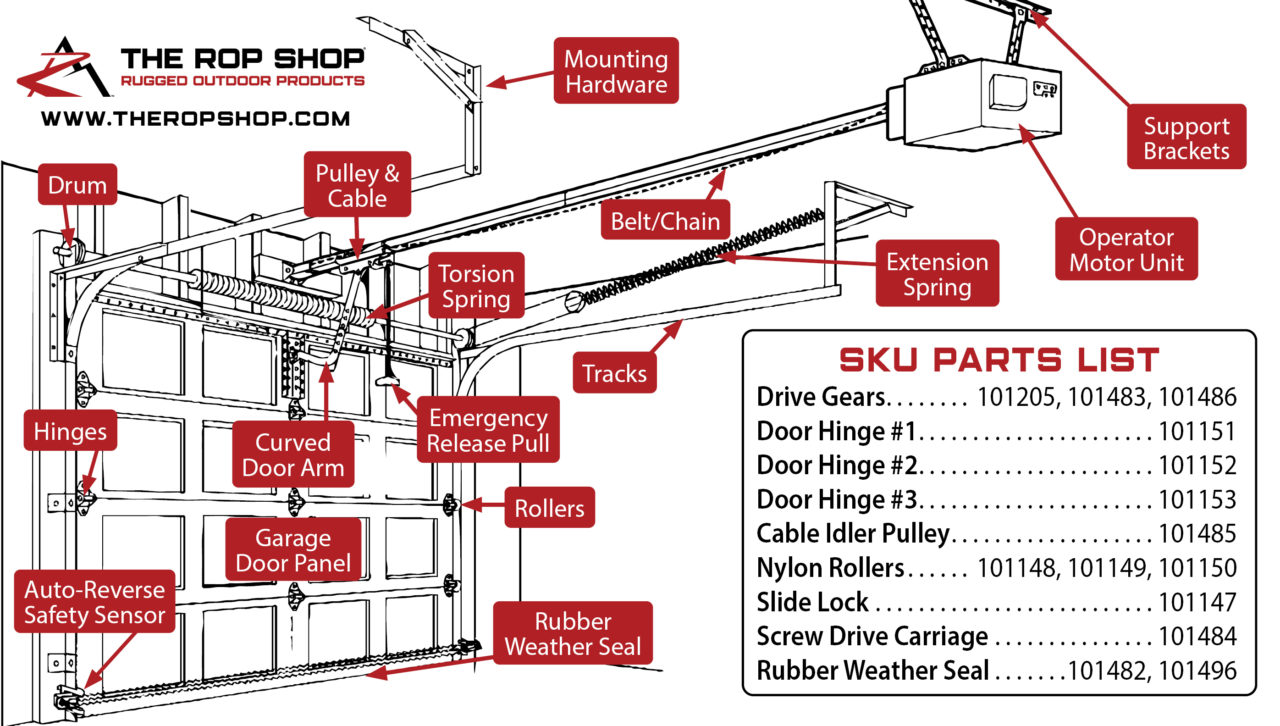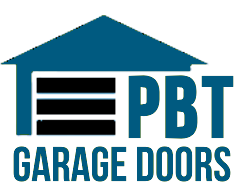If you’re a DIY enthusiast looking to tackle your garage door repairs, you’ve come to the right place! In this article, we’ll delve into the essential safety precautions you need to know before embarking on any DIY garage door project.
So, what are the safety precautions for DIY garage door repairs? It’s crucial to prioritize safety when working with heavy machinery and high tension springs. Luckily, we’ve got you covered. We’ll walk you through the necessary steps to ensure you stay safe throughout the repair process.
Now, let’s dive in and explore the safety measures you should take before getting your hands dirty with your garage door repairs. It’s all about working smarter, not harder, so let’s get started!
– Disconnect the power: Before starting any repairs, unplug the garage door opener or turn off the power supply.
– Wear protective gear: Put on safety glasses, gloves, and sturdy shoes to protect yourself from potential hazards.
– Use proper tools: Only use the recommended tools for the repair job to minimize the risk of accidents.
– Follow instructions: Read the manufacturer’s manual or watch tutorial videos to understand the repair process thoroughly.
– Seek professional help if needed: If the repair seems complex or dangerous, it’s best to call a professional garage door repair service.
Remember, prioritizing safety is crucial when working on DIY garage door repairs.

The Safety Precautions for DIY Garage Door Repairs
1. Understanding the Risks Involved
Before diving into any DIY garage door repairs, it’s important to understand the potential risks involved. Garage doors are heavy and operate under significant tension, which means that improper handling can lead to serious injuries or even fatalities. It’s crucial to approach these repairs with caution and prioritize safety at all times.
Ensure that you are physically fit and have the necessary strength to handle the weight of the garage door. Be aware of potential hazards such as falling objects, pinching points, and high tension springs or cables. Familiarize yourself with the workings of your specific garage door system and understand the potential dangers associated with it.
Additionally, always wear appropriate safety gear such as gloves, safety glasses, and sturdy footwear. Do not attempt any repairs if you are unsure or uncomfortable with the level of risk involved. It’s better to seek professional help than risk your safety or the proper functioning of your garage door.
2. Preparing the Workspace
Prior to starting any DIY garage door repairs, it is essential to prepare your workspace to minimize the risk of accidents or injuries. Begin by clearing out any debris or objects that may obstruct your movement or interfere with the repair process. Sweep the area clean to avoid trips or slips.
Next, ensure that the garage door opener is disconnected from the power source to prevent any accidental activation while you work. This will eliminate the risk of the door unexpectedly opening or closing as you perform repairs. You can usually disconnect the power by unplugging the opener or shutting off the circuit breaker designated for the garage.
Lastly, secure the garage door in its open position using locking devices or clamps. This will prevent it from inadvertently closing while you are working underneath or near it. Be sure to follow the manufacturer’s instructions or consult a professional if you are unsure of the proper method to secure your specific type of garage door.
3. Using the Right Tools and Equipment
Using the right tools and equipment for DIY garage door repairs is essential for both your safety and the successful completion of the task. Before starting any repairs, gather the necessary tools such as a wrench set, pliers, screwdrivers, and a hammer. Ensure that they are in good condition and suitable for the specific task at hand.
It’s also important to have a sturdy and reliable ladder or step stool that is appropriate for your height and the height of your garage door. Avoid using makeshift platforms or unstable equipment that can increase the risk of falls or accidents.
If you are uncertain about the tools or equipment required for a particular repair, consult the manufacturer’s manual or seek advice from a professional. Investing in high-quality tools and equipment will not only enhance your safety but also make the repair process more efficient and effective.
4. Following Proper Maintenance Procedures
Regular maintenance of your garage door can help prevent the need for extensive repairs and minimize safety risks. Inspect your garage door and its components regularly for signs of wear and tear or damage. Look out for loose or frayed cables, worn-out springs, misaligned tracks, and any unusual noises or vibrations during operation.
Perform routine lubrication of the moving parts such as hinges, rollers, and springs to ensure smooth and safe functioning. Tighten any loose screws or bolts, and replace any worn-out or damaged components promptly. Following the manufacturer’s recommended maintenance procedures will help prolong the lifespan of your garage door and reduce the likelihood of accidents or malfunctions.
Remember to unplug the garage door opener before attempting any maintenance work to avoid accidental activations. If you encounter any complex issues during your inspection or maintenance, it’s best to consult a professional who can provide expert guidance and assistance.
5. Knowing When to Seek Professional Help
While DIY garage door repairs can save you money and provide a sense of accomplishment, it’s crucial to recognize when a repair is beyond your skill level or expertise. Some repairs may require specialized knowledge, tools, or training, and attempting them without the necessary qualifications can lead to more significant problems or safety hazards.
If you encounter complex issues such as major structural damage, faulty circuitry, or significant spring or cable repairs, it’s best to seek professional assistance. Garage door technicians have the expertise and experience to handle intricate repairs safely and efficiently, ensuring the longevity and proper functioning of your garage door.
By knowing your own limitations and when to rely on professionals, you can prioritize your safety and the well-being of your garage door. Don’t hesitate to contact trusted garage door repair companies in your area to ensure the job is done correctly and safely.
6. The Role of Regular Inspections
Regular inspections play a crucial role in maintaining the safety of your garage door. By detecting potential issues early on, you can address them proactively and prevent accidents or more extensive damage. Set a schedule for inspecting your garage door at least twice a year or more frequently if you notice any signs of wear or malfunction.
During your inspection, pay attention to the balance and alignment of the garage door. It should move smoothly and evenly along the tracks, without any excessive shaking or jerking. Check the springs, cables, rollers, and hinges for signs of fraying, stretching, or corrosion. Look for gaps or damage in the weatherstripping that may compromise the seal.
If you notice any warning signs, such as strange noises during operation, difficulty in opening or closing, or damaged components, take immediate action. Consult a professional to diagnose the problem and carry out the necessary repairs. Regular inspections and timely maintenance will significantly contribute to the safety and proper functioning of your garage door.
Gathering the Right Tools
Before you start your DIY garage door repairs, it’s important to gather the right tools to ensure a smooth and successful repair process. The right tools can make your life easier and help you avoid any unnecessary complications or safety hazards. Here are some essential tools that you may need:
7. Wrench Set
- A wrench set with various sizes is essential for loosening or tightening bolts and nuts.
- Make sure to have both open-end wrenches and socket wrenches in your set.
- Choose a high-quality wrench set that is durable and reliable.
8. Pliers
- Pliers are versatile tools that can be used to grip, bend, or cut various materials.
- Ensure you have a set of pliers with different types such as slip-joint pliers, needle-nose pliers, and locking pliers.
- These will come in handy for tasks such as tightening cables, removing pins, or straightening bent components.
9. Screwdrivers
- Invest in a good set of screwdrivers, including both flathead and Phillips head screwdrivers.
- These will be necessary for removing or tightening screws on the garage door or its components.
- Choose screwdrivers with comfortable handles and strong tips to prevent slippage and maximize efficiency.
10. Hammer
- A lightweight hammer is useful for tapping components into place or removing stubborn parts.
- Choose a hammer with a comfortable grip and a durable head that won’t chip or break easily.
- Exercise caution when using a hammer near glass or delicate components to avoid damage.
11. Ladder or Step Stool
- Having a stable and appropriate-sized ladder or step stool is crucial for reaching high or overhead areas during repairs.
- Ensure the ladder is in good condition and can support your weight.
- Choose a ladder with non-slip steps and rubber feet to prevent accidents.
12. Safety Gear
- Always prioritize your safety by wearing appropriate gear such as gloves, safety glasses, and sturdy footwear.
- Gloves will protect your hands from sharp edges, pinches, or potential burns.
- Safety glasses will guard your eyes against debris or flying particles.
- Sturdy footwear with good traction will provide stability and prevent slips or falls.
13. Other Tools
- Depending on the specific repair you are undertaking, you may also need additional tools such as a level, tape measure, wire cutters, or a voltage tester.
- Always refer to the manufacturer’s manual or seek professional advice if you are unsure about the tools required for a specific repair.
By ensuring that you have the necessary tools before starting your DIY garage door repairs, you can save time and effort while minimizing safety risks. It’s always better to be well-prepared and equipped to handle the task at hand.
Common DIY Garage Door Repair Mistakes to Avoid
While attempting DIY garage door repairs can be rewarding and cost-effective, it’s crucial to be aware of common mistakes that homeowners often make. Avoiding these mistakes will not only ensure your safety but also prevent further damage to your garage door. Here are some common mistakes to avoid:
14. Neglecting Safety Precautions
One of the biggest mistakes homeowners make is neglecting safety precautions during DIY garage door repairs. Garage doors are heavy and operate under tension, posing significant risks if mishandled. Always prioritize safety by wearing protective gear, securing the door in place, and disconnecting the power source. Following proper safety procedures will reduce the likelihood of accidents or injuries.
15. Lack of Proper Planning
Rushing into a DIY garage door repair without proper planning can lead to costly mistakes. Take the time to research and understand the specific repair you are undertaking. Familiarize yourself with the necessary tools and techniques, and gather all the required materials before starting. Proper planning will help you tackle the repair process efficiently and minimize the risk of errors.
16. Incorrect Diagnosis
A common mistake is misdiagnosing the problem with the garage door. This can lead to attempting unnecessary repairs or overlooking underlying issues. Take the time to thoroughly inspect the door, identify the exact problem, and diagnose it accurately. If you are unsure, consult professional technicians who can provide expert advice and guidance. A correct diagnosis will save you time, effort, and potential further damage.
17. Improper Handling of Springs and Cables
Attempting to handle garage door springs or cables without the necessary knowledge and expertise is extremely dangerous. These components are under high tension and can cause severe injuries if mishandled. Avoid attempting spring or cable repairs unless you have proper training or experience. It’s best to leave such tasks to professionals who have the necessary tools and expertise to handle them safely.
18. Incorrect Installation or Adjustment
Improper installation or adjustment of garage door components can lead to malfunctioning, increased wear and tear, or even accidents. Follow the manufacturer’s instructions or consult professional technicians for guidance on proper installation and adjustment techniques. This will ensure that your garage door operates smoothly and safely, providing you with optimal performance and longevity.
19. Ignoring Warning Signs
Ignoring warning signs of a malfunctioning garage door can lead to worsening problems and potential safety hazards. If you notice unusual noises, jerky movements, or difficulty in opening or closing the door, address the issue promptly. Ignoring these warning signs can lead to more extensive and costly repairs. Consult professional technicians to diagnose and rectify the problem to avoid further damage or accidents.
20. Overlooking Regular Maintenance
Regular maintenance is crucial for the longevity and safety of your garage door. Overlooking routine maintenance tasks such as lubrication, cleaning, and inspection can lead to premature wear and costly repairs. Make it a habit to schedule regular maintenance and adhere to it diligently. Regular maintenance will not only prevent potential issues but also keep your garage door functioning optimally and extend its lifespan.
By avoiding these common DIY garage door repair mistakes, you can ensure your safety, prevent further damage, and enjoy the benefits of a well-functioning and reliable garage door. Remember that when in doubt, it’s always better to seek professional assistance to avoid any potential risks or complications.
Choosing Professional Garage Door Repair Services
While DIY garage door repairs can be a cost-effective and rewarding option, there are certain situations where it is best to rely on professional garage door repair services. Professionals have the knowledge, expertise, and specialized tools to handle complex repairs safely and efficiently. Here are some factors to consider when choosing professional garage door repair services:
21. Experience and Expertise
Look for garage door repair companies with extensive experience and a proven track record of successful repairs. Experienced professionals will have encountered a wide range of repair issues and will be well-versed in determining the most effective and efficient solutions. They can quickly diagnose the problem and provide accurate estimates for the repair costs and timeline.
22. Licensing and Insurance
Ensure that the garage door repair company you choose is licensed and insured. Licensing ensures that the company meets all the necessary industry standards and regulations. Insurance coverage protects you from any liability in case of accidents or damages during the repair process. Request proof of licensing and insurance before engaging the services of a garage door repair company.
23. Range of Services
Consider the range of services offered by the garage door repair company. A reputable company will be able to handle various types of repairs, including spring replacements, cable repairs, track realignment, opener repairs, and more. Having a single company that can address all your garage door repair needs simplifies the process and ensures consistency in the quality of work.
24. Prompt Response and Availability
Choose a garage door repair company that offers prompt response times and is readily available for emergencies. A malfunctioning or damaged garage door can compromise the security and functionality of your home, so it’s essential to have a repair service that can quickly attend to your needs. Look for companies that offer 24/7 emergency services to ensure peace of mind.
25. Transparent Pricing
Inquire about the pricing structure of the garage door repair company to ensure transparency and avoid any unexpected costs. Reliable companies will provide detailed estimates that outline the cost of labor, replacement parts, and any additional fees. Be wary of companies that offer significantly lower prices than their competitors, as this may indicate subpar workmanship or the use of inferior parts.
26. Warranty on Workmanship and Parts
Check if the garage door repair company provides warranties on their workmanship and the parts they use. A warranty ensures that any issues or defects arising from the repair work will be addressed without incurring additional costs. A reputable company stands behind their work and will offer warranties as a testament to the quality and reliability of their repairs.
27. Positive Customer Reviews and Recommendations
Read customer reviews and ask for recommendations to gauge the reputation and reliability of the garage door repair company. Positive reviews and recommendations from satisfied customers are a good indication of the company’s commitment to high-quality repairs and excellent customer service. A trustworthy company will have a strong online presence and a solid reputation within the community.
By considering these factors and taking the time to research and select a reputable garage door repair service, you can ensure that your repairs are conducted professionally and efficiently. Professional services provide peace of mind, guaranteeing that your garage door is functioning optimally and that you and your family are safe and secure.
Conclusion
DIY garage door repairs can save you money and provide a sense of accomplishment, but they require a cautious and informed approach. By understanding the risks involved, preparing your workspace, using the right tools, and following proper maintenance procedures, you can ensure your safety and the successful completion of the repairs.
However, it’s important to recognize when a repair is beyond your skill level and when to seek professional help. Neglecting safety precautions, lacking proper planning, and making incorrect adjustments are common mistakes to avoid. Regular inspections and maintenance are vital for identifying potential issues early on and addressing them proactively.
If you decide to hire professional garage door repair services, consider factors such as their experience, licensing and insurance, range of services, pricing transparency, warranties, and customer reviews. Choosing a reputable company will guarantee high-quality repairs and reliable service.
Whether you choose to tackle DIY garage door repairs or rely on professionals, prioritize safety and proper maintenance to ensure the longevity and optimal performance of your garage door. A well-maintained and properly functioning garage door not only enhances the aesthetics of your home but also contributes to your convenience and security.
Key Takeaways: Safety Precautions for DIY Garage Door Repairs
- Wear protective gear, such as safety goggles and gloves, to prevent injuries.
- Disconnect the power supply to the garage door opener to avoid electrical accidents.
- Ensure the door is fully closed and securely supported before starting any repairs.
- Use proper tools and techniques, following manufacturer’s instructions or professional advice.
- If unsure or for complex repairs, consult a professional garage door technician.
Frequently Asked Questions
When it comes to DIY garage door repairs, safety should always be the top priority. Making sure you take the necessary precautions can help prevent accidents and injuries. Here are some commonly asked questions about the safety measures you should take when working on your garage door.
1. How should I prepare before starting a DIY garage door repair?
Before you begin any DIY garage door repair, there are a few important steps you should take to ensure your safety. Firstly, make sure to read and understand the manufacturer’s manual or instructions for your specific garage door model. This will give you important information about the repair process and any safety precautions specific to your garage door.
Next, gather all the necessary tools and equipment needed for the repair. This may include safety goggles, gloves, a sturdy ladder, and any specific tools recommended by the manufacturer. It’s also a good idea to have a first aid kit nearby in case of any accidents.
2. What safety gear should I wear when working on my garage door?
When working on your garage door, it’s essential to wear the appropriate safety gear to protect yourself from potential hazards. Safety goggles should always be worn to protect your eyes from debris, flying particles, or any loose hardware. Additionally, wearing gloves can provide protection for your hands and fingers.
If you’re working at heights, such as on a ladder or elevated platform, make sure to wear non-slip shoes to prevent falls. It’s also a good idea to wear clothing that covers your arms and legs to protect against scratches or cuts.
3. How should I handle electrical components when repairing my garage door?
If your garage door repair involves electrical components, it’s crucial to take the necessary precautions to avoid electrical accidents. Before starting any work, ensure that the power to the garage door opener is turned off. This can usually be done by disconnecting it from the electrical outlet or turning off the circuit breaker that controls the garage door.
When handling electrical components, avoid touching any live wires or exposed connections. It’s a good idea to use insulated tools specifically designed for electrical work to minimize the risk of electrical shock. If you’re unsure about how to safely handle electrical components, it’s best to consult a professional.
4. Are there any precautions I should take when working with heavy garage door panels?
Working with heavy garage door panels requires extra caution to prevent injuries. If you’re removing or adjusting panels, make sure to have someone assist you to avoid straining your back or causing an accident. It’s important to use appropriate lifting techniques, keeping your back straight and using the strength of your legs.
When removing or installing panels, make sure to secure the area around the garage door to prevent it from accidentally closing or falling. Use clamps or locking mechanisms to stabilize the door and ensure it remains in a secure position while you work.
5. Should I attempt DIY garage door repairs if I’m unsure about the process?
If you’re unsure about the process or lack experience with garage door repairs, it’s best to err on the side of caution and seek professional assistance. Garage doors are complex systems, and improper repairs can lead to further damage or pose safety risks. Professional technicians have the knowledge, skills, and tools required to handle garage door repairs safely and effectively.
By calling a professional, you can ensure that the repair is done correctly, minimizing the risk of accidents or further complications. It’s always better to prioritize your safety and leave complex garage door repairs to the experts.

Summary
Doing DIY garage door repairs can be dangerous, so here are some important safety precautions to remember. First, always switch off the power to the garage door opener to avoid electrocution. Second, use proper tools and equipment, like safety glasses and gloves, to protect yourself. Third, never attempt to repair the springs yourself as they are under high tension and can cause severe injuries. Lastly, if you’re unsure or uncomfortable about any repair, it’s best to call a professional for help.
Remember, your safety comes first, so take these precautions seriously before attempting any garage door repairs on your own.

